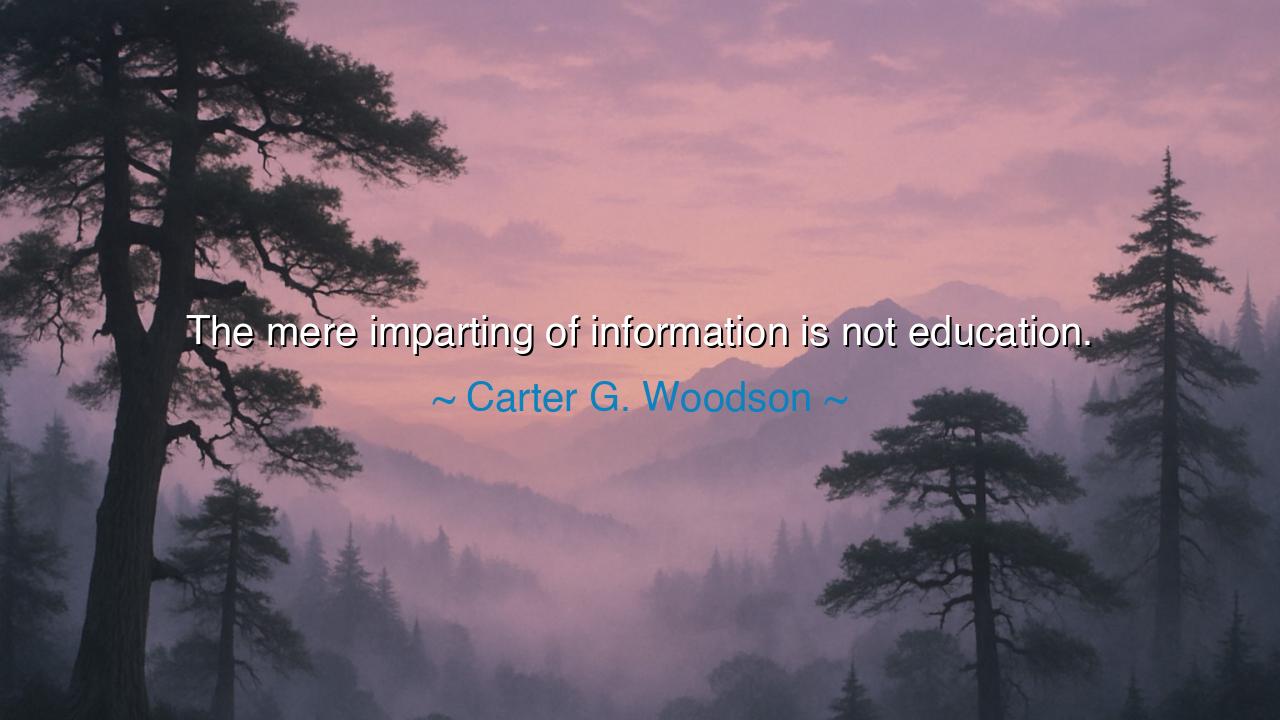
The mere imparting of information is not education.






In the noble words of Carter G. Woodson, the father of Black History and one of the most profound educators of his age, there shines a truth that pierces the very heart of learning: “The mere imparting of information is not education.” These words, though simple, carry the weight of centuries — for they remind us that education is not the memorization of facts, but the awakening of the mind and the stirring of the soul. Information fills the mind, but education transforms it. The one builds knowledge without wisdom; the other builds character, purpose, and understanding. In this distinction lies the difference between a life of imitation and a life of meaning.
To understand the origin of this truth, we must look to the life of Carter G. Woodson himself — a man born in 1875 to formerly enslaved parents, who rose through hardship and toil to become one of the greatest scholars of his time. He earned a doctorate from Harvard when such a thing was nearly unthinkable for a Black man in America. Yet he never mistook degrees for enlightenment. He saw that the schools of his day were filled with lessons but empty of truth — teaching young Black men and women about European kings and conquerors while erasing their own heroes and histories. To Woodson, this was not education, but indoctrination, a hollow transfer of facts that left the spirit starved. From this conviction was born his mission: to redefine what true education meant — not the feeding of information, but the liberation of the mind.
Woodson’s insight reaches back to the teachings of the ancients, who knew that wisdom could not be poured into a person like water into a vessel. Socrates taught through questions, not answers, for he believed the soul must labor to give birth to its own understanding. Confucius said that learning without thought is labor lost. The ancients knew what Woodson rediscovered: that information without reflection is like seed without soil — it never takes root, never bears fruit. To be truly educated is not merely to know, but to discern, to question, to act. The ignorant memorize; the wise understand.
And yet, how often do societies confuse the two! Schools become factories, churning out students filled with data but devoid of conviction. The world praises those who recite facts, but forgets those who think deeply. Woodson saw this danger clearly. He warned that when education serves only to repeat the ideas of others, it ceases to be a path to freedom and becomes a tool of control. He wrote that when a man’s mind is enslaved, you need not chain his body; he will walk willingly into his own oppression. Thus, he declared that true education must teach not what to think, but how to think — to challenge, to seek truth, to know oneself.
Consider the story of Frederick Douglass, who, like Woodson, understood this difference. As a boy enslaved, Douglass learned his first letters from his master’s wife. But when her husband forbade her from teaching him — fearing that knowledge would make the boy unfit for servitude — Douglass grasped the deeper truth: that education is freedom. He taught himself to read, not from books alone, but from life — from observation, from struggle, from the very chains that bound him. His education was not the imparting of information, but the awakening of power. When he said, “Once you learn to read, you will be forever free,” he echoed the same spirit as Woodson: that true education enlightens the mind and liberates the soul.
Woodson’s warning also speaks to our own age. In a world overflowing with information — endless facts, screens, and voices — we risk losing sight of wisdom. Information has become abundant, but understanding has grown scarce. We know how to find answers, but we no longer ask the right questions. To heed Woodson’s wisdom is to remember that education must shape the whole person — intellect, conscience, and heart. It must teach empathy, justice, and responsibility, or it becomes an empty pursuit. To be “educated” in the modern sense without moral clarity is to be like a ship with sails but no compass.
The lesson, then, is this: seek not only to be informed, but to be transformed. Let your learning refine your character as much as it sharpens your intellect. Read not only to know, but to grow. When you study, ask yourself — does this knowledge make me more human, more compassionate, more free? Do not mistake cleverness for wisdom, nor information for truth. For as Woodson taught, the purpose of education is not to fill the mind, but to liberate the soul.
So, my listener, remember Carter G. Woodson’s immortal words. Do not let your education be shallow — a collection of facts without fire, or achievements without understanding. Instead, learn as the wise have always learned: through reflection, through questioning, through compassion. Let every book you read, every truth you uncover, make you more just, more aware, more alive. For information may fade, but wisdom endures — and only wisdom can light the path to freedom.






AAdministratorAdministrator
Welcome, honored guests. Please leave a comment, we will respond soon